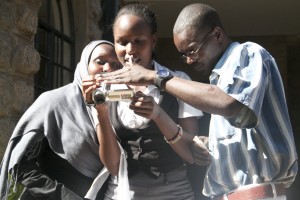27
Feb
 Across the country, pockets of Kenyans are determined to use video to protect their democracy during the March 4th elections. Bukeni Waruzi just returned from training these activists and citizen journalists, and here’s what he taught them.
Across the country, pockets of Kenyans are determined to use video to protect their democracy during the March 4th elections. Bukeni Waruzi just returned from training these activists and citizen journalists, and here’s what he taught them.
The brutality of December 2007 came as a surprise. Kenya has suffered bouts of electoral turbulence before, but that month’s elections led to unprecedented violence: killings, rapes, lootings, attacks on civilians, and massive displacement. Historically peaceful, Kenya devolved into violence that caught many unprepared—including human rights activists who were unable to use video to document the magnitude of what was happening.
 Kenya is again on the cusp of historic elections: on March 4th, 14.3 million people are expected to cast their ballots. This time, many are working to keep mayhem at bay.
Kenya is again on the cusp of historic elections: on March 4th, 14.3 million people are expected to cast their ballots. This time, many are working to keep mayhem at bay.
On a January trip to Nairobi, activists were honest and realistic: “We didn’t have the skills; we didn’t have the tools; we were not prepared.” I was there to assess the possibility of building activists’ capacity to document election violence through video—and the idea was well received. Over and over again, I heard things like “we’re working hard to prepare to document election violence, if any occurs, and your training will come right in time.”
And so I’ve just returned from training over 120 activists and citizen witnesses in five cities: Mombasa, Kisumu, Eldoret, Nakuru and Nairobi. Doing what WITNESS does best, we worked with citizens and activists who want to use video to document and advocate against rights violations. That meant making sure that people have the skills to document rights violations at any time, with available means, to maximize the availability and viability of evidence.
The ‘means’ is a critical component, and Kenya is well placed in this respect: just last month, the country achieved a 77% cell phone usage rate. Many people have access to Android phones, and these Android phones are equipped with cameras.

So the gap in Kenya is in skills, and that’s what our trainings focused on. We taught concrete lessons, like how to film on a mobile phone, and how to film so that videos can stand as evidence in a trial.
But there are far more potential documenters than could attend our workshops. There’s an incredible appetite among Kenyans to protect their peaceful democracy through this round of elections, and to use video to do so.
So we’re also sharing our election video documenting guides online, in Swahili. The tip sheets below are designed as quick, concrete, and easy-to-follow guides to filming the Kenyan elections.
How to Film the Kenyan Election
All documents in Swahili can be found on the WITNESS website Swahili page.
How to Film an Election (Swahili & English)
Only have time for one page?
If you read and share one document, make it this one-page guide. It lays out the basics of documentation, with steps for getting better footage. It’s available in English and Swahili.
Filming for Human Rights Documentation and Evidence (Swahili)
Want your video to be useable in a newsroom or a courtroom?
This short guide shares how to enhance the footage’s quality for media, documentation, and evidence purposes.
Filming with a Mobile Phone (Swahili)
Using a cell phone to take a video?
Read this, and your video will have better sound, lighting, and stability—and you’ll stay safer.
Recording Interviews (Swahili)
Talking to someone about their experiences or thoughts?
Read this to get the most important aspects of interview preparation, technical considerations, informed consent, and conducting an interview.
Concealing Identity (Swahili)
Want to film someone but conceal their identity?
This guide shares methods you can use during and after filming (and you can always use YouTube’s new blur feature).
Interviewing Survivors of Sexual Violence (Swahili)
Talking to someone who has experienced gender-based violence?
Learn hot to plan and conduct interviews, including specific safety and security tips, ethical considerations, and practical advice on interview language, set-up, and follow-up.
Uploading your Footage Online (Swahili)
Want to share what you filmed, so others will see it?
This sheet shows what you can do to get your video seen, including effecting titling of clips, what to include in a video descriptions, and security and privacy considerations.
Informed Consent Guidelines (Swahili)
Filming people?
They should agree to being filmed and having the footage shared before you film. This sheet goes over the basic principles of informed consent, why we do this, and what your interviewee needs to understand before proceeding. It includes sample questions for obtaining informed consent from an interviewee on camera.
Author: Bukeni, WITNESS
Bukeni Tete Waruzi is the Program Manager for Africa & the Middle East at WITNESS. He has expertise in working against gender-based violence, and has worked extensively on decommissioning child soldiers in the Democratic Republic of the Congo.
